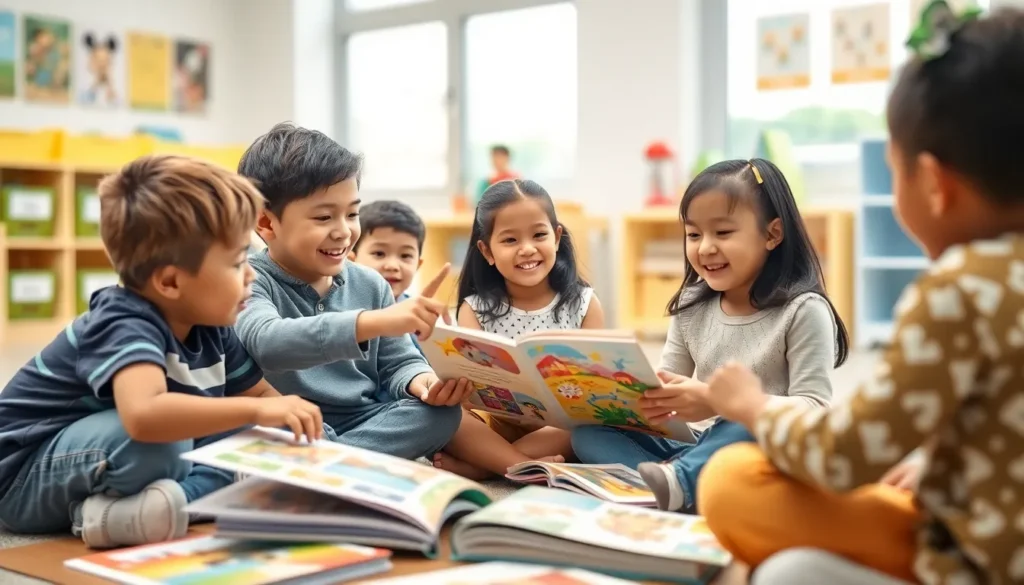Language skills are crucial for children’s development, shaping their ability to communicate, learn, and interact with the world. As kids grow, they navigate a complex landscape of sounds, words, and meanings, laying the foundation for their future academic and social success. Understanding how these skills evolve can help parents and educators support children in reaching their full potential.
From babbling infants to articulate school-aged children, each stage of language development presents unique milestones. Engaging with children through conversation, reading, and play not only enhances their vocabulary but also fosters critical thinking and creativity. By recognizing the importance of nurturing language skills, caregivers can create an enriching environment that promotes effective communication and lifelong learning.
Table of Contents
ToggleUnderstanding Kids Language Skills
Language skills are crucial for children’s overall development, influencing their ability to communicate and interact with others. Understanding the importance of these skills and the stages of their acquisition supports effective learning.
Importance of Language Development
Language development enhances cognitive abilities and social skills. Strong language skills enable children to express their thoughts clearly, engage in conversations, and build relationships. Children with advanced language abilities often show improved academic performance and better problem-solving skills. Research indicates that language development also influences emotional intelligence, allowing children to understand and articulate their feelings effectively.
Stages of Language Acquisition
Language acquisition occurs in several distinct stages:
- Cooing (0-3 months): Babies produce cooing sounds, combining vowel sounds without intentional meaning. This stage lays the foundation for vocalization.
- Babbling (4-6 months): Infants begin to produce repeated consonant-vowel combinations like “ba-ba” and “da-da.” This stage introduces rhythm and intonation.
- Single Words (12 months): Children start saying single words like “mama” and “dada.” These words often symbolize important objects or people in their lives.
- Two-Word Phrases (18-24 months): Children combine two words to form simple phrases, such as “want cookie” or “big truck.” This stage marks the beginning of sentence formation.
- Simple Sentences (2-3 years): Kids begin to use simple sentences, expressing more complex ideas. Phrases become longer, often consisting of three or four words.
- Complex Sentences (3-5 years): Children create complex sentences using conjunctions. They can narrate experiences, ask questions, and share details more effectively.
Each stage builds on the previous one, contributing to a child’s overall communication skills. Recognizing these stages helps parents and educators provide appropriate support and encourage development through targeted activities and interactions.
Factors Influencing Kids Language Skills

Multiple elements shape children’s language skills, including genetic factors and environmental influences. Understanding these components helps caregivers support language development effectively.
Genetic Influences
Genetic factors impact language acquisition and development significantly. Research shows that children with family histories of language delays may experience similar challenges. Genetic predispositions can affect cognitive processes and neural pathways vital for language progression. Studies indicate that specific genes related to communication abilities may play a role in how children learn and use language.
Environmental Factors
Environmental factors contribute substantially to language skills in children. Exposure to rich language environments enhances vocabulary, comprehension, and expression. Parents, caregivers, and educators can facilitate language growth through diverse interactions, such as reading to children and engaging in discussions. Social interactions with peers also promote the use of language in context. Access to resources, such as books and educational materials, further supports language development. Studies highlight that early and frequent communication leads to improved language skills, underscoring the importance of nurturing relationships during formative years.
Methods to Enhance Kids Language Skills
Enhancing kids’ language skills involves engaging activities that foster communication and comprehension. Various techniques facilitate language development through interaction and conversation.
Interactive Reading Techniques
Interactive reading techniques significantly boost language skills. These approaches include:
- Asking Questions: Encourage kids to predict outcomes or identify characters in stories. This practice promotes critical thinking and comprehension.
- Using Props: Incorporate toys or puppets relevant to the story. Props help visualize concepts and make reading sessions engaging.
- Modeling Expressions: Demonstrate emotions and actions while reading. This method enriches vocabulary and demonstrates nonverbal communication cues.
- Involving Children: Allow kids to narrate parts of a story or describe pictures. Their participation fosters confidence and reinforces language comprehension.
Encouraging Conversations
- Open-Ended Questions: Use questions that require more than yes or no answers. This technique urges children to elaborate and express themselves.
- Active Listening: Show interest in kids’ thoughts. Responding thoughtfully validates their contributions and enhances their speaking skills.
- Role-Playing Scenarios: Create imaginative situations for children to enact dialogues. Role-playing cultivates fluency and social language use.
- Daily Discussions: Integrate conversations into daily routines. Discussing daily activities or feelings promotes vocabulary usage and expressive language skills.
Common Challenges in Kids Language Skills
Many children encounter challenges in developing strong language skills, which can impact their communication and overall development. Addressing these challenges promptly can lead to successful interventions and support.
Speech Delays
Speech delays occur when children do not meet expected language milestones. These delays can manifest as difficulties in pronouncing words, using appropriate vocabulary, or forming sentences. Factors contributing to speech delays include hearing impairments, environmental influences, and developmental conditions. Early intervention, such as speech therapy, plays a crucial role in helping children progress. Engaging in frequent conversations, reading aloud, and using expressive language can also stimulate language development.
Language Disorders
Language disorders encompass a range of communication issues that affect a child’s ability to understand and produce language. Common types include expressive language disorder, where children struggle to convey thoughts verbally, and receptive language disorder, characterized by difficulty understanding spoken or written language. Children with language disorders may face challenges in social situations and academic performance. Professional assessment and tailored therapeutic strategies provide essential support. Activities such as language games, storytelling, and interactive reading enhance communication skills, promoting overall language development.
Nurturing language skills in children is a vital investment in their future. As they develop these abilities, they not only enhance their communication but also improve cognitive and social skills. Engaging them through conversation, reading, and interactive play fosters a rich language environment that supports their growth.
Recognizing the stages of language development allows parents and educators to provide the right support at the right time. By addressing challenges early and utilizing effective strategies, caregivers can help children overcome obstacles and thrive in their language journey. Ultimately, strong language skills lay the foundation for successful learning and meaningful relationships throughout life.




